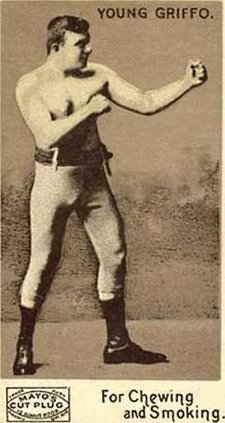Each week we’ll take a step back into the history of Great Bend through the eyes of reporters past. We’ll reacquaint you with what went into creating the Great Bend of today, and do our best to update you on what “the rest of the story” turned out to be.
Entertainment as the world of 1895 knew it was at the cusp of a sea change this week in 1895. On May 20, the first commercial movie performance occurred in New York City.
According to The Palace Amusement Company and History Orb.com, “A boxing match between Australian fighter, Albert Griffiths (Young Griffo) and Charles Barnett, [filmed on the rooftop of Madison Square Garden on May 4, 1895 by Woodville Latham and his sons Otway and Grey] was the first motion picture in the world to be projected onto a screen before a paying audience, at a storefront theatre, 156 Broadway in New York City. It was titled Young Griffo v. Battling Charles Barnett.”
In short order, vaudeville theaters would begin to show movies along with live entertainment, until those entertainers became obsolete. Around the turn of the century, Great Bend had three movie theaters to choose from.
Silver and gold
But this week in 1895, readers of the Barton County Democrat of Great Bend wrestled with the issue of retaining a gold system of currency, or adopting a free silver system. After the Silver Panic of 1893, the country was in the throes of depression, and the president was forced to make a deal with J.P. Morgan to bail out the country before all gold reserves were gone. The outcome of the debate in 1896 would spell the end of President Grover Cleveland’s political career.
“Judge Cladwell, of the United States Circuit court for the Eighth district, says some plain things in favor of the coinage of both gold and silver at a ratio of 16 to 1.”
The judge’s opinion was in favor of the United States moving out from under England insofar as financial policy was concerned.
“I have been surprised that the issue has been so long delayed,” he said. “The fight ought to have been forced years ago on the line of absolute and unqualified free coinage of gold and silver at the ratio of 16 to 1, without regard to the action of England or any other foreign power. If we are to be subservient to England in our financial policy, why not in other matters? If we are not capable and able to establish and maintain our own financial policy, we ought to haul down “Old Glory,” which you fought so gallantly to uphold, and turn the government over to Queen Victoria, or ask Canada to annex us.”
These words, coming at the eve of Decoration Day, had to hit a nerve. Those who deal in numismatics will be familiar that the 1895 Morgan Silver Dollar is among the most sought after coins of its type, second to the 1893 which was minted the year of the Silver Panic.
Tax refund?
It was also this week that the United States Supreme Court determined that the income tax law of the day was unconstitutional. The majority of five declared it a direct tax because (it was) not apportioned according to representation.
“Internal Revenue Commissioner Miller has telegraphed all collectors of internal revenue to forward at once to his office all income tax returns. There has been collected about $80,000 under the income tax law. Commissioner Miller, as soon as he is officially informed of the supreme court’s decision, will, no doubt, take steps to refund all of the collections.”
That showed an awful lot of faith in the government. Eventually, sentiments changed, and now, we all take income tax for granted.
Paying respect
Decoration Day services were announced this week. Sales, vacation, and camping trips were not mentioned.
“We should engage in this service with true appreciation of the benefit of liberty and union guaranteed to us by their heroic sacrifices. We should endeavor to realize the unselfish devotion to country which prompted them to lay down their own lives that generations to come might enjoy the blessings of a free united and prosperous country. We should close our places of business, lay aside our usual avocations and devote the day to exercises communicative of the virtues of our dead comrades.”
The multi-day observance included the following: The Pap Thomas Post of the Grand Army of the Republic would assemble at the G.A.R. Hall on Sunday, May 26 at 10 a.m. and then proceed to the Methodist Episcopal Church for the Memorial services. On May 30, they would proceed to the cemetery for a day of programs. Businesses were asked to close, and all with wagons and carriages and other vehicles bring them to the cemetery to help bring people to the cemetery.
Wreaths and bouquets were made and graves were decorated. Songs were sung, bands played, and prayers and a benediction were given.
Out of the Morgue
Silver, gold, taxation and decoration in 1895





